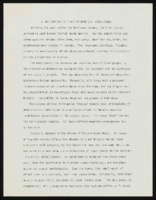Search the Special Collections and Archives Portal
Search Results

Transcript of interview with Joseph L. Haughaboo by James F. Haughaboo, April 1, 1976
Date
Archival Collection
Description
On April 1, 1976, James F. Haughaboo interviewed his father, Joseph L. Haughaboo in his father’s home at 954 Lulu Avenue, Las Vegas, Nevada. The two discuss Haughaboo’s personal family history, his occupational history, and Mr. Haughaboo’s observations of Las Vegas city life since he moved to the state in 1953.
Text

"A Half Century of Black Memorabilia: 1890-1940s": manuscript draft by Roosevelt Fitzgerald
Date
Archival Collection
Description
From the Roosevelt Fitzgerald Professional Papers (MS-01082) -- Unpublished manuscripts file.
Text

Larry Mason interview, September 14, 2018: transcript
Date
Archival Collection
Description
Interviewed by Nathalie Martinez. Larry Mason is an Arizona native that moved to Las Vegas as a Higher Education Administrator. He was born in Tuscon, Arizona, but grew up mostly in East Los Angeles and his "Gramitas" ranch in Sonora, Mexico. He has a history in athletics as a basketball player in his upbringing which brought him to play at the New Mexico Highlands University and the European League. Earning a Masters in Education, Larry Mason came to Las Vegas to become the first Latino Director of Admissions at UNLV, first Latino President of the Board of Education, and first Latino Vice President of the Board of Education in the Clark County School District. He launched an incredible amount of movements within the educational field in Las Vegas including (but not limited to): the Mariachi program, the magnet school program, and the growth of the Diversity Division within the NSHE. Some of his greatest supporters and allies included Senator Harry Reid, John Lujan and Tom Rodriguez. Mason continues to work as a community leader for minority representation in STEM fields, as a board member for the Nevada STEM Coalition.
Text

Maria Casas interview, June 12, 2019: transcript
Date
Archival Collection
Description
Interviewed by Maribel Estrada Calderón. Farmersville is described as a small town between, Exeter and Visalia, California populated by Mexican American farm workers. It is in this small town, where UNLV History Professor Maria Raquél Casas spent her childhood raised along with her sisters and brothers. In her interview, Dr. Casas describes how growing up in this small town with her traditional Mexican family influenced the person she is today. While working alongside her family in the fields, Dr. Casas decided that she would strive to obtain an education. Through hard work and constant support from her sister, Dr. Casas attended Fresno State, where she discovered her love for history. Upon completing her undergraduate program, Dr. Casas made the decision to further her education by pursuing a master's at Cornell University. At Cornell, she faced discouraging professors who believed she would not be able to complete the master's program let alone pursue a PhD program. Despite these demoralizing professors, Dr. Casas completed her program and was admitted into University of California Santa Barbara's history program. Dr. Casas never forgot her roots or the significance of her presence in the majority white academic spaces she attended during her academic journey. When she arrived at UNLV, she continued to strive for more Latino representation in both the student population and in the school faculty. During her tenure at UNLV, Dr. Casas has served as an advisor for multiple Latino student organizations including MEChA and SoL. Dr. Casas has witnessed much progress in Latino representation at UNLV, but she believes there is still much work left to be accomplished.
Text

Maria Moore interview, August 2, 2019: transcript
Date
Archival Collection
Description
Interviewed by Elsa Lopez. Born in Belize, Director of AARP, speaks English, Spanish and Creole. Specialist in senior affairs.
Text

Transcript of interview with Jay Poster by Barbara Tabach, August 26, 2016
Date
Archival Collection
Description
Music brought Jay Poster to Las Vegas for a brief time in 1974. Jay wanted to pursue a musical career and his cousin was a professional musician with the Nat Brandwynne Orchestra at Caesars Palace. To Jay?s disappointment, within a few months his cousin Jack Poster left Las Vegas for a road tour. So Jay decided his best strategy was to return home to San Diego and his studies at San Diego State University. It would be over a decade later before Jay returned to Las Vegas to live and this time it became permanent. This time it was not for music. For beyond his musical talent, Jay had a gift for connecting with people of all of ages and walks of life. He was good at sales and his day job selling office furniture offered him the opportunity to transfer to Las Vegas in 1986. Within a few years, however, it was a recruiter for Palm Mortuaries who introduced Jay to his defining career moment and to Allen Brewster, a prominent Jewish leader and founder of King David Cemetery and Mortuary. It was 2001. Jay has been King David?s ever since and is the General Manager. In this interview, Jay describes his personal and spiritual growth through his career in funeral services and his respect for the Jewish traditions of burial and grieving. In addition, his passion for music has also soared and he talks about his participation in the Shabbatones at Congregation Ner Tamid and Desert Winds, a community based performance organization. He shares his love of traditional Jewish klezmer music and the Meshugginah Klezmorim.
Text

Transcript of interview with Michael Saltman by Barbara Tabach, December 16, 2014
Date
Archival Collection
Description
In this interview, Michael Saltman recounts his family background, his schooling in Michigan, and living abroad in London and Munich. His travels to Israel in 1968 reinforced his connection to Judaism. Saltman and his wife, Sonja, moved to Las Vegas in 1975 and he began working with Larry Larkin, who eventually became his partner. He discusses several projects he completed with Larkin, including shopping centers and apartment complexes. He talks about the changes in Las Vegas that came about from the availability of financing from legitimate sources, and the population growth of the area. He then talks about his involvement in the local Jewish community with the Jewish Federation, Anti-Defamation League and Congregation Ner Tamid.
In 1942, Michael Saltman, the son of a rugged Canadian entrepreneur and of an educator, was born in Flint, Michigan. Michael spent a fulfilling childhood in Flint, where his family was involved in the Jewish community, even helping start a new temple. However, his life changed dramatically when his father passed away during his teenage years. At his mother's insistence, Michael went to law school after graduating from Michigan State University, and received his Juris doctor from Wayne State University. From Detroit, Michael headed to London to participate in an LL.M. program, though he quickly withdrew and landed a position with a life insurance and investment company in London. Michael soon relocated to the company's Geneva office, where his job included establishing operations in Israel. It was during these trips that he more intensely connected with Judaism and his Jewish identity. Michael left the company to join a former colleague at Shareholders Capital Corporation, where he met his wife Sonja. The couple moved to Munich, where they lived until 1975, until moving to Las Vegas. In Las Vegas, Michael became a successful real estate developer. His projects include apartments, shopping centers and office parks, like Village Apartments, Campus Village Shopping Center and Renaissance Center. He later opened Food 4 Less grocery stores in Nevada, Utah and California, eventually buying the Kansas-based company from Lou Falley. He and his partner later sold the company to Kroger. Michael served on the local Jewish Federation's board of directors, and Sonja is a longtime board member for the Anti-Defamation League's regional office in Las Vegas. In 2003, Michael and Sonja co-founded the Saltman Center for Conflict Resolution within William S. Boyd School of Law. Michael's other efforts to promote peaceful conflict resolution include the production of Streetball Hafla, a movie shot in Israel about Jewish and Palestinian teenagers interacting in basketball camp.
Text

Transcript of interview with Myrtle Hancock by Russell Oakes. February 26, 1980
Date
Archival Collection
Description
On February 26, 1980, collector Russell Oakes interviewed beautician, Myrtle Hancock (born January 1st, 1921 in Craig, Colorado) in her residence in Las Vegas, Nevada. This interview covers the narrator’s occupational experience as a wardrobe dresser in the entertainment industry in Las Vegas. She also discusses family life, life on a ranch, Downtown Las Vegas, Helldorado, and Nevada’s hot weather. The interview concludes with a discussion on the development of Las Vegas and the projected future growth.
Text


